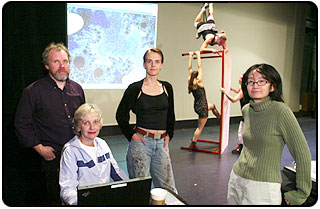 The worlds of mathematics and computer science will combine with the worlds of poetry and dance at Wake Forest University in December for “Fibonacci and Phi,” a multimedia performance presented by Winston-Salem’s Alban Elved Dance Company and the computer science department at Wake Forest.
The worlds of mathematics and computer science will combine with the worlds of poetry and dance at Wake Forest University in December for “Fibonacci and Phi,” a multimedia performance presented by Winston-Salem’s Alban Elved Dance Company and the computer science department at Wake Forest.
“Fibonacci and Phi” will be performed Dec. 4-7 at Wake Forest. The dance performance is the first of its kind for the university and features one of the newest developments in art – digital/multimedia art. The collaboration is an important step in the trend to encourage understanding between the arts and the sciences, says Jennifer Burg, chair of Wake Forest’s computer science department.
The performance will use the mathematical phenomena Fibonacci and Phi as the basis for its dance, poetry, music and backdrops. The Fibonacci sequence is a series of numbers that is found naturally in the patterns of rose petals, pinecones and seashells. Phi is known as the Golden Ratio and is associated with classic architecture and paintings. Through digital poetry, interactive dance and multimedia presentations, “Fibonacci and Phi” will encourage the audience to consider the relationship between art and science.
For one part of the performance, Burg and others are programming complex equations into computers that will produce colorful fractal images projected on a screen on stage. The equations are processed in real-time using the university’s high-speed Internet connection to its supercomputer in downtown Winston-Salem, and dancers will control the images’ shape and design by intersecting with lasers beamed across the stage. Using bungee cords, ropes, and fabric, dancers will perform physical dance moves and lifts to the changing images.
Yue-Ling Wong, lecturer in digital media at Wake Forest, has created a segment for the performance using digital poetry that will allow the audience to enter words and phrases using hand-held computers that will grow on a computer-generated fractal tree projected on stage. The words then shed from the tree like leaves and may recombine into different verses. In another piece, dancers will dance under a virtual snow, a computer-generated 3-D animation that the audience will view through 3-D glasses. Dancers will also try to move with 3-D mannequin animations which will be controlled by other dancers.
Live musicians will perform an original score for the performance which will also be based on the Fibonacci sequence.
Collaborators on the performance say “Fibonacci and Phi” will expose audiences to new ways of thinking about art and technology.
“We want to break through what we traditionally consider dance to be,” says Jonathan Christman, assistant professor of theatre at Wake Forest and director of lighting for the project. “We want to get people who don’t ordinarily go to see dance performances to say ‘Oh, that’s dance?’”
Alban Elved Dance Company was founded by choreographer and artistic director Karola Luttringhaus in Berlin, Germany in 1997. The company, known for its athletic and contemporary dance performances, moved to North Carolina in 1999. Luttringhaus is head of the production and choreography for the performance.
“Fibonacci and Phi” will be performed Dec. 4-6 at 8 p.m. and Dec. 7 at 2 p.m. All performances will be in the MainStage Theatre in Wake Forest’s Scales Fine Arts Center. Tickets are $15 for adults, $10 for students and senior citizens. For ticket information, call 336-758-5295.
A forum held during performance weekend will discuss the economic impact of art on the local community. The forum, featuring local business and arts leaders, will be held Dec. 6 from 3:45-5 p.m. Prior to the forum, the collaborators of the performance will hold a symposium from 1-3:30 p.m. Both events will be held in Scales Fine Arts Center and are free and open to the public.
“Fibonacci and Phi” is part of the university’s theme year “Fostering Dialogue: Civil Discourse in an Academic Community,” which is dedicated to exploring how free people with passionate interests and beliefs can communicate openly without turning dialogue into discord.
Categories: Arts & Culture, Events
Headlines
Wake Forest in the News
Wake Forest regularly appears in media outlets around the world.




